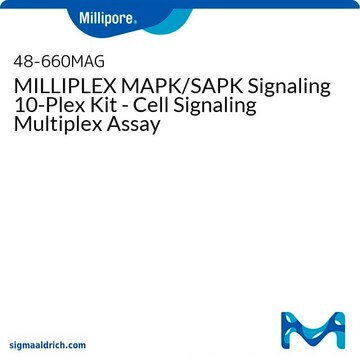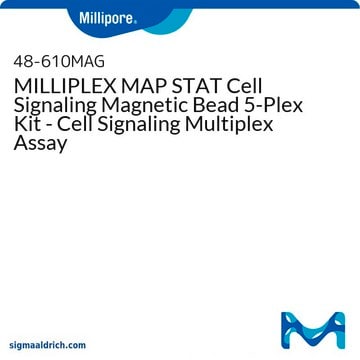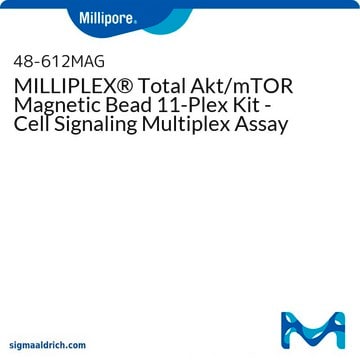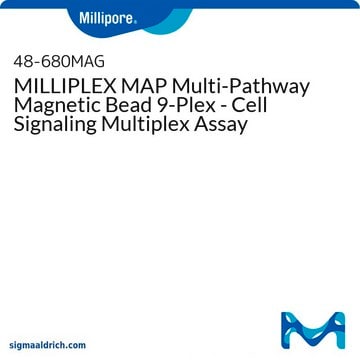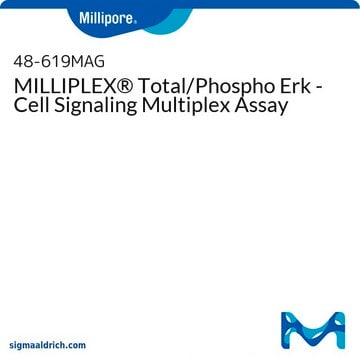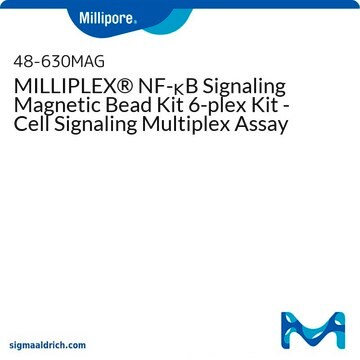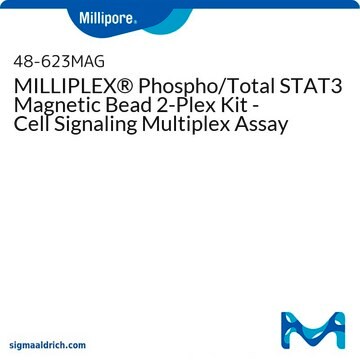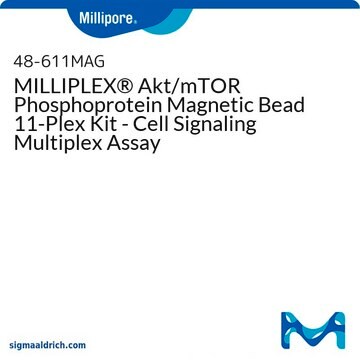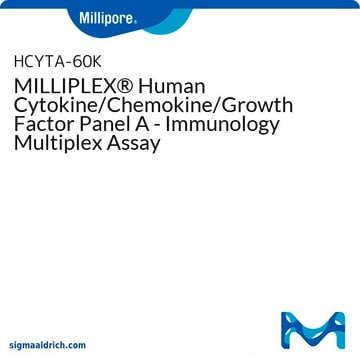HPRTKMAG-01K
MILLIPLEX® RTK Phosphoprotein Magnetic Bead Panel- Cell Signaling Multiplex Assay
allows simultaneous relative quantitation of multiple proteins in tissue and cell lysate samples
About This Item
Produits recommandés
Niveau de qualité
Espèces réactives
human
Fabricant/nom de marque
Milliplex®
Technique(s)
multiplexing: suitable
Méthode de détection
fluorometric (Luminex xMAP)
Conditions d'expédition
ambient
Description générale
The MILLIPLEX® RTK Phosphoprotein Bead Customizable Panel is used to detect changes in phosphorylated (panTyr) c-Kit, c-Met/HGFR, EGFR, ErbB2/HER2, ErbB3/HER3 , ErbB4/HER4 , FGFR1 , FLT3 , IGF-1R, M-CSFR, PDGFRα, PDGFRβ, TIE1, TIE2, VEGFR1, VEGFR2, and VEGFR3 in cell lysates using the Luminex® system.
The MILLIPLEX® portfolio offers the broadest selection of analytes across a wide range of pathways. Once the panel of interest has been identified, you can rely on the quality we build into each kit to produce results you can trust. Performance criteria evaluated during the validation process include: cross-reactivity, assay CVs, kit stability, and sample behavior. In addition, each kit meets stringent Quality Control criteria to ensure lot-to-lot reproducibility.
The MILLIPLEX® RTK Phosphoprotein Bead Panel includes:
- Positive and negative control cell lysates provided to qualify assay performance
- Configurable beads to capture analytes of interest
- Optimized detection antibody cocktail designed to yield consistent analyte profiles within a panel
Panel Type: Cell Signaling
Spécificité
Application
- Analytes: c-Kit, c-Met/HGFR (panTyr), EGFR (pan Tyr), ErbB2/HER2, ErbB3/HER3 (panTyr) ,ErbB4/HER4 (panTyr), FLT3 (pan Tyr), IGF-1R (pan Tyr), M-CSFR (pan Tyr), PDGFR-α (pan Tyr), PDGFRß (pan Tyr), TIE1 (pan Tyr,) Tie2 (pan Tyr), VEGFR1 (pan Tyr), VEGFR2 (pan Tyr), VEGFR3 (pan Tyr), FGFR1
- This 17-plex panel, unlike most signaling kits that are fixed/premixed, is customizable so that it is possible to choose only those analytes that are wanted or needed.
- Recommended Sample type: cell lysate
- Recommended starting concentration: 40 to 1,000 μg protein/mL
- Assay Run Time: Overnight
- Research Category: Signaling Apoptosis & Cancer
Caractéristiques et avantages
Conditionnement
Stockage et stabilité
Informations légales
Clause de non-responsabilité
Mention d'avertissement
Danger
Mentions de danger
Conseils de prudence
Classification des risques
Acute Tox. 4 Oral - Aquatic Acute 1 - Aquatic Chronic 2 - Eye Dam. 1 - Skin Irrit. 2
Code de la classe de stockage
10 - Combustible liquids
Certificats d'analyse (COA)
Recherchez un Certificats d'analyse (COA) en saisissant le numéro de lot du produit. Les numéros de lot figurent sur l'étiquette du produit après les mots "Lot" ou "Batch".
Déjà en possession de ce produit ?
Retrouvez la documentation relative aux produits que vous avez récemment achetés dans la Bibliothèque de documents.
Contenu apparenté
Multiplex assays simplify cancer research by measuring multiple biomarkers simultaneously for various signaling pathways.
Multiplex assays simplify cancer research by measuring multiple biomarkers simultaneously for various signaling pathways.
Multiplex assays simplify cancer research by measuring multiple biomarkers simultaneously for various signaling pathways.
Multiplex assays simplify cancer research by measuring multiple biomarkers simultaneously for various signaling pathways.
Notre équipe de scientifiques dispose d'une expérience dans tous les secteurs de la recherche, notamment en sciences de la vie, science des matériaux, synthèse chimique, chromatographie, analyse et dans de nombreux autres domaines..
Contacter notre Service technique